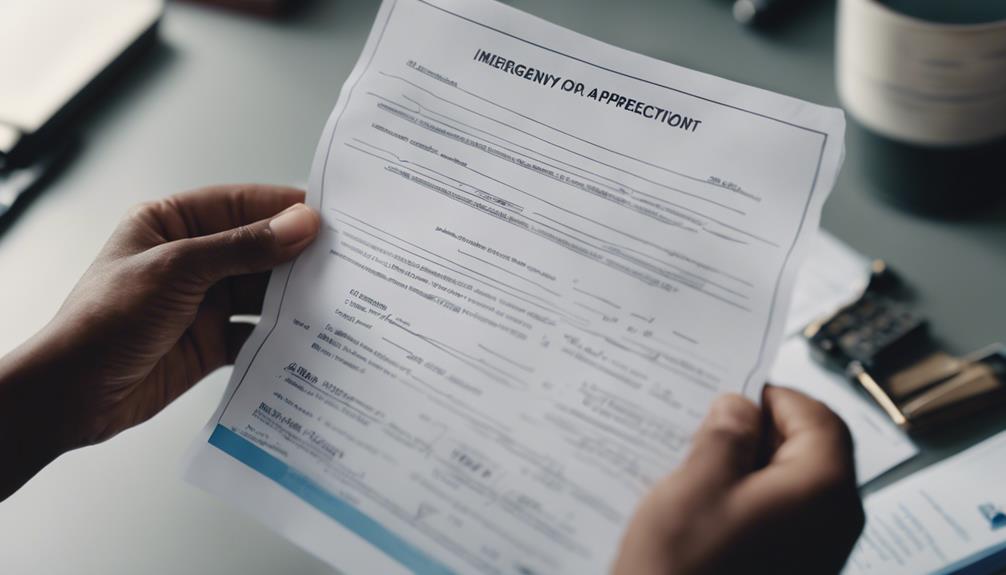To apply for Emergency Medicaid, crucial documents like proof of income, personal identification, medical records, and additional supporting paperwork are essential. Valid government-issued photo ID, Social Security card, and accurate personal identification are necessary. Submit recent pay stubs or tax returns for income verification. Detailed medical records provide insight into health history and ongoing conditions. Supplementary documents like utility bills and medical records help establish eligibility and urgency for medical assistance. Ensure meticulous preparation of paperwork to expedite the application process.
Eligibility Criteria

To determine eligibility for Emergency Medicaid, individuals must meet specific criteria outlined by the state's Medicaid program. Emergency Medicaid benefits are designed to provide temporary coverage for medical emergencies to individuals who do not qualify for regular Medicaid due to their immigration status.
The application process for Emergency Medicaid typically involves submitting documentation such as proof of income, medical bills related to the emergency, and a statement from a healthcare provider detailing the medical necessity of the treatment. Applicants may also need to demonstrate that they are residents of the state where they are applying for Emergency Medicaid.
Additionally, individuals must meet income requirements set by the state Medicaid program to qualify for benefits. It is essential for applicants to carefully follow the instructions provided by the state Medicaid office to ensure that their application is complete and accurate.
Required Personal Identification
Submitting valid personal identification is a crucial step in the Emergency Medicaid application process to verify the applicant's identity and eligibility for benefits. When applying for Emergency Medicaid, individuals are typically required to provide a government-issued photo ID, such as a driver's license, state ID card, or passport. This identification verification is essential to confirm the applicant's identity and ensure that the benefits are allocated to the right person.
In addition to a photo ID, applicants may also need to submit their Social Security card as part of the application process. The Social Security card helps to authenticate the applicant's Social Security number, which is often a key piece of information used to determine Medicaid eligibility.
Ensuring that the personal identification provided is current and accurate is vital for a smooth application process. Any discrepancies or outdated information could potentially delay the approval of Emergency Medicaid benefits. Being meticulous in preparing these documents can help streamline the application process and expedite the receipt of much-needed healthcare coverage.
Proof of Income

Verifying income is a fundamental requirement in the Emergency Medicaid application process to assess the applicant's financial eligibility for receiving benefits. When submitting proof of income, applicants typically need to provide recent pay stubs or tax returns. Pay stubs offer a snapshot of the individual's earnings, detailing information such as hourly wage, hours worked, and deductions. These documents are crucial as they demonstrate the applicant's current income level and can help Medicaid officials determine the individual's financial need for emergency assistance.
Tax returns, on the other hand, offer a more comprehensive overview of the applicant's financial situation. They provide information on annual income, deductions, credits, and taxes paid. Tax returns are especially useful for self-employed individuals or those with fluctuating incomes, as they offer a more stable representation of their financial standing over a period of time.
Medical Records
Medical records play a crucial role in the Emergency Medicaid application process by providing essential information about the applicant's health status and treatment history. These records offer a comprehensive view of the individual's health history, including past illnesses, medications prescribed, and any ongoing medical conditions. Having access to detailed medical records ensures that the Medicaid review board can accurately assess the applicant's medical needs and determine eligibility promptly.
Moreover, medical records can also include doctor referrals, which are important in validating the necessity of ongoing medical care. Referrals from healthcare providers can support the applicant's case by confirming the need for specialized treatments or consultations with specialists. These referrals serve as professional endorsements of the medical services required by the individual seeking Emergency Medicaid assistance.
Therefore, when preparing an Emergency Medicaid application, it is crucial to gather complete and up-to-date medical records that provide a clear picture of the applicant's health status and treatment needs, along with any relevant doctor referrals to strengthen the case for immediate medical assistance.
Additional Supporting Documents

Supplementary documentation such as proof of income and identification papers are vital components of an Emergency Medicaid application. When applying for Emergency Medicaid, providing supporting documents is crucial to ensure the smooth processing of your application.
Proof of income helps determine your eligibility for the program, as Emergency Medicaid is typically reserved for individuals with low incomes who are facing medical emergencies. Additionally, identification papers such as a driver's license or passport are necessary to verify your identity and prevent any fraudulent activities during the application process.
In the application process for Emergency Medicaid, required paperwork may also include documents like utility bills to establish your residency, medical bills related to the emergency treatment, and any insurance information you may have. These additional supporting documents play a significant role in demonstrating your need for urgent medical assistance through the Emergency Medicaid program.
Conclusion
In conclusion, the process of applying for emergency Medicaid requires specific documents to verify eligibility and ensure timely assistance.
By providing the necessary personal identification, proof of income, and medical records, individuals can expedite their application and receive the necessary medical care they need.
It is important to gather all required documents to streamline the application process and receive the support needed during times of emergency.
